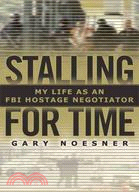An enraged man abducts his wife and child and holes up in a secluded mountain cabin. Prisoners take over their cell block and seize guards as hostages, threatening to kill them unless their demands are met. A right wing survivalist amasses a cache of weapons and resists calls to surrender. In each case, the local police call in the FBI, and the FBI calls Gary Noesner, who designed the FBI's Crisis Negotiation Course and in his 23 year career managed hundreds of cases of kidnapping, hijacking, and other kinds of hostage crises. Stalling for Time tells the story of that remarkable career though a series of incredibly tense and gripping minute- by-minute accounts of Noesner's most challenging cases.
At the start of Noesner's career hostage negotiation is a new discipline, and he and his colleagues receive a great deal of on the job training. He quickly realizes that in every hostage crises there are at least two entities to be managed: the hostage taker and his law enforcement colleagues. It's often the latter that proves the greater challenge. Law enforcement officers are used to having their orders followed and don't like being made to wait. They tend toward the "action imperative"--going in with guns blazing, and view Noesner and his fellow negotiators with thinly veiled contempt. But as Noesner learns early, the slow, patient negotiation is much more likely to save the lives of hostages and other officers. It's only after several high profile failures, including the debacles at Waco and Ruby Ridge, that the negotiators gain the upper hand.
Stalling for Time covers many of the most famous hijackings, sieges, and hostage incidents of the last several decades, including Waco, the Montana Freeman, the Republic of Texas, the Talladega and Lucasville Prison Riots, and the Washington D.C. sniper case. With great novelistic flair and minute-by-minute detail, Noesner delivers a true crime read of the first order, as well as a primer for anyone looking to learn the art of successful negotiation.
| FindBook |
|
有 1 項符合
Noesner的圖書 |
 |
$ 774 | Stalling for Time ─ My Life as an FBI Hostage Negotiator
作者:Noesner,Gary 出版社:Random House Inc 出版日期:2010-09-21 語言:英文 規格:精裝 / 15.9 x 24.1 x 2.5 cm / 普通級   看圖書介紹 看圖書介紹
|
|
|
圖書介紹 - 資料來源:博客來 評分:
|










